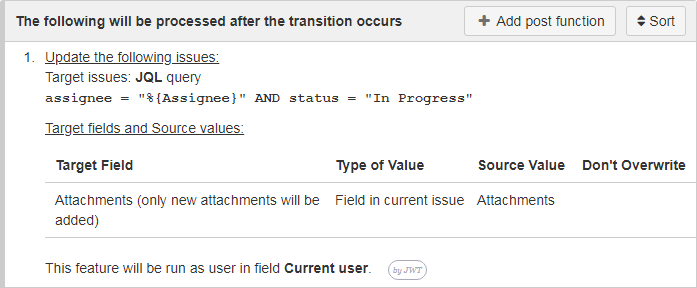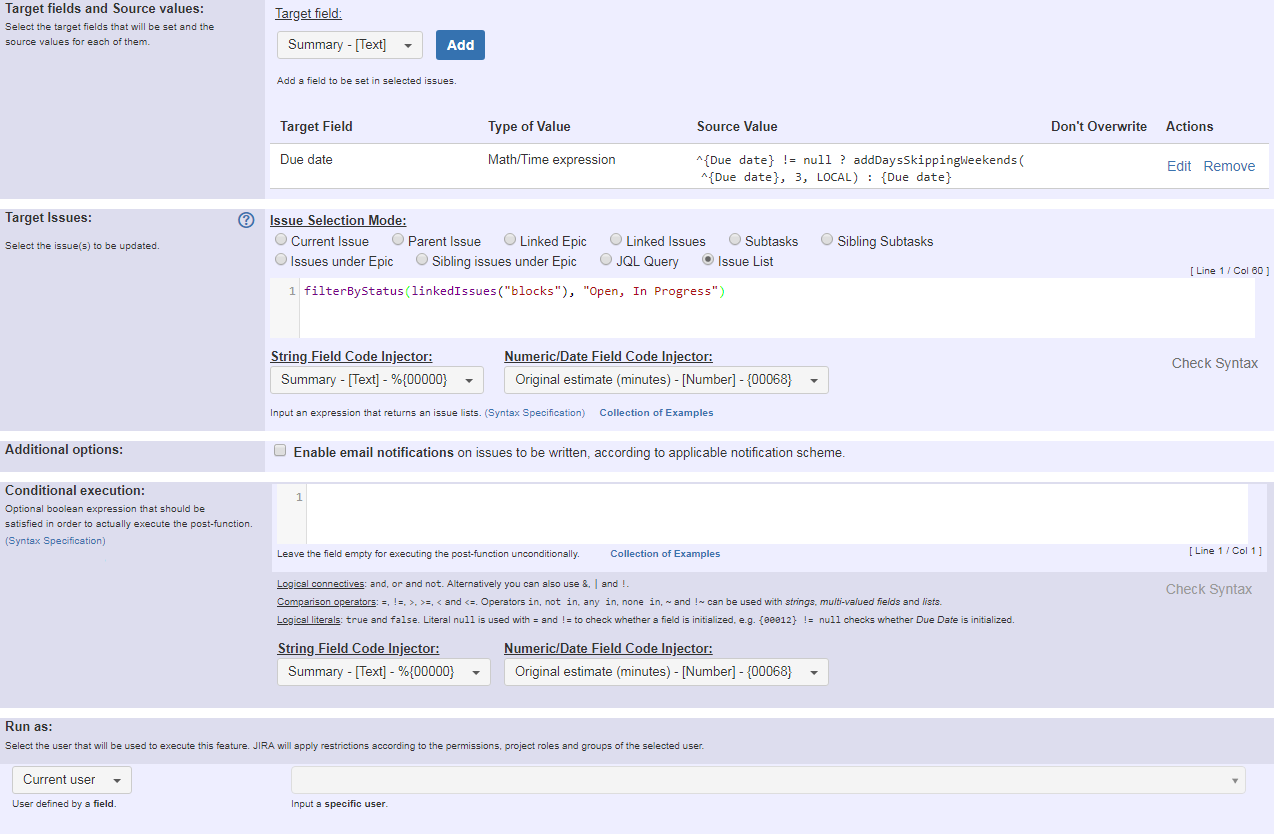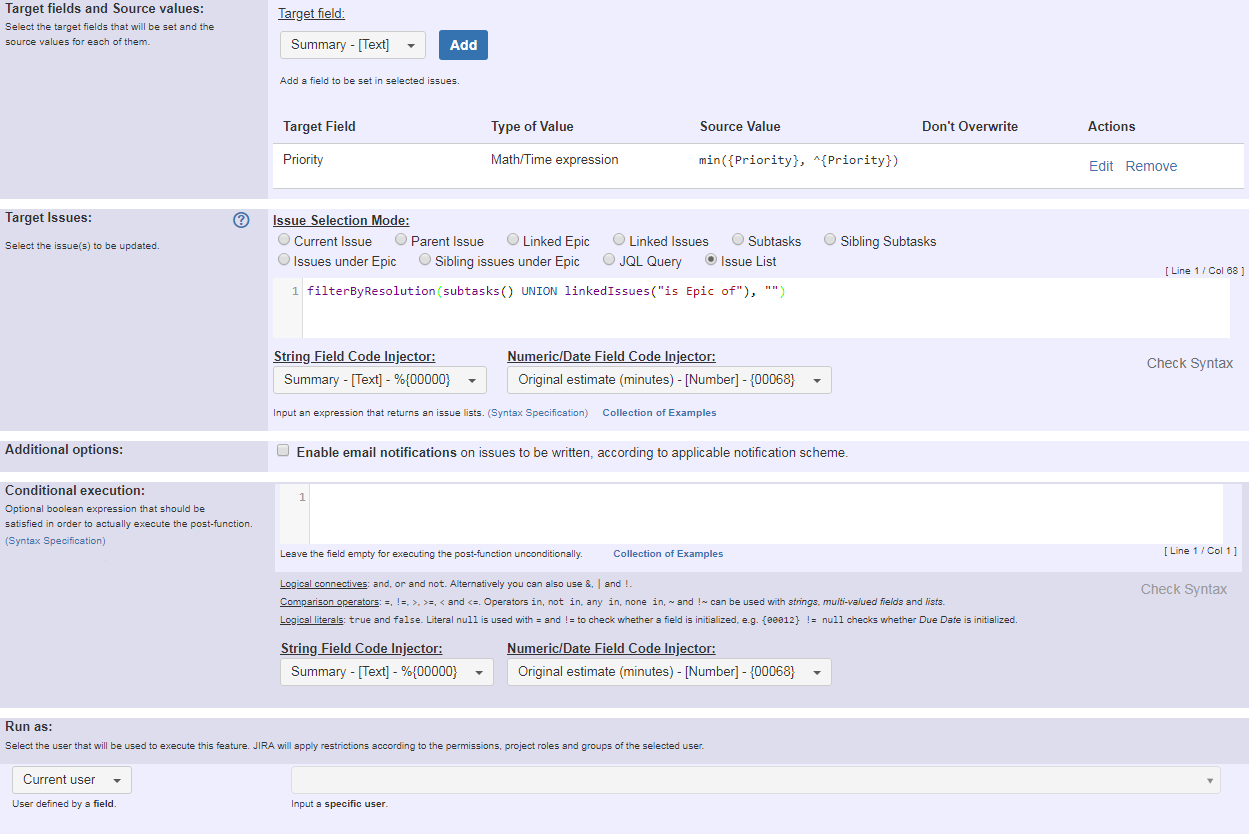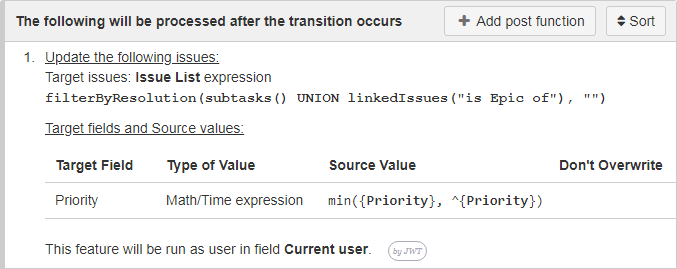This function has been renamed with the JWT 3.0 release.
Find the new documentation at:
Renamed: Former "Write field on issues returned by JQL query or issue list" SINCE VERSION 2.4.0
Purpose
This post-function is used for setting fields in issues selected by predefined options, a JQL Query or an Issue List expression, using any of the target fields.
- Field in current issue: the value a field in current issue.
- Parsed text (basic mode): a text composition where value of fields in current issue can be inserted.
- Parsed text (advanced mode): a string expression where we can use values of fields in current issue (syntax %{nnnnn}), and in JQL selected issues (syntax ^%{nnnnn}). Here we can use all the functions available in the Expression Parser.
- Math or Date-Time expression: an expression returning a numeric value where we can use values of fields in current issue (syntax {nnnnn}), and in JQL selected issues (syntax ^{nnnnn}). Here we can use all the functions available in the Expression Parser.
Example 1: Adding attachments uploaded in current issue's transition to other issues
Files attached to current issue in current transition's screen will be added to issues in status "In Progress" and assigned to the same user that has current issue assigned:
JQL query used is: assignee = "%{00003}" AND status = "In Progress"
Note that:
- %{00003} if field code for "Assignee"
Once configured, your post-function will look like this:
Example 2: Add 3 days to due date in issues blocked by current issue
Due date of issues linked to current issue with "blocks" issue link type, will be added 3 days, skipping weekend's days. In case the Due date is not set in blocked issues, it will be set using current issue's due date as value.
Described action will be carried out only into blocked issues in statuses "Open" or "In Progress".
Text to be parsed is:
^{00012} != null ? addDaysSkippingWeekends(^{00012}, 3, LOCAL) : {00012}
filterByStatus(linkedIssues("blocks"), "Open, In Progress")
Note that
- {00012} is field code for field "Due date"
- ^{00012}is field code for field "Due date" in blocked issues
Once configured, your post-function will look like this:
Example 3: Set priority in non-resolved tasks and subtasks to epic's priority if it's higher
This post-function is intended to be executed in Epic's workflow, i.e., current issue is an Epic.
Text to be parsed is:
min({00017}, ^{00017})
filterByResolution(subtasks() UNION linkedIssues("is Epic of"), "")
Note that:
- {00017} is field code for field "Priority"
Once configured, your post-function will look like this:
Configuration Parameters
Issue Selection Modes
There are several modes for selecting the issues whose field values are going to be set.
New since Version 2.4.0: Current Issue, Parent Issue, Linked Epic, Linked Issues, Subtasks, Sibling Subtasks, Issues under Epic and Sibling issues under Epic.
These new options simplify the usage of this post function a lot. For this cases no JQL Query or Issue List has to be configured.
JQL Query
In this issue selection mode we use JQL, which is a language provided by Jira for doing advanced issue searching.
You can insert field codes with format %{nnnnn} in your JQL query. These field codes will be replaced with the values of the corresponding fields in current issue at execution time, and the resulting JQL query will be processed by Jira JQL Parser. This way you can write dynamic JQL queries that depend on values of fields of current issue. Example: issuetype = "%{00014}" AND project = "%{00018}" will return issues in same project and with same issue type as current issue.
When you write your JQL for selecting the issues, take into account the following advices:
- If field values are expected to have white spaces or JQL reserved words or characters, you should write field code between quotes (double or simple). Example:
summary ~ "%{00021}"will return issues with current user's full name. As full name can contain spaces, we have written the field code between double quotes.
- In general we will write field codes between quotation marks, since in most cases it doesn't hurt and it's useful for coping with field values containing white spaces or reserved JQL words. Anyway, there is an exception to this general rule: when our field contains a comma separated list of values, and we want to use it with JQL operator IN. In those cases we will not write the field code between quotes, since we want the content of the field to be processed as a list of values, not as a single string value.
Example: Let's assume that "Ephemeral string 1" (field code %{00061}) contains a comma separate list of issue keys like "CRM-1, HR-2, HR-3". JQL Queryissuekey in ("%{00061}")will be rendered in runtime like issuekey in ("CRM-1, HR-2, HR-3"), which is syntactically incorrect. On the other hand, JQL Queryissuekey in (%{00061})will be rendered in runtime like issuekey in (CRM-1, HR-2, HR-3), which is correct.
Disabling JQL Syntax Pre-Checking
When we enter our JQL query, a syntax pre-checking is carried out in order to verify that it's correctly written. But when we insert field codes in our JQL query, the definitive form of the query that will be executed is unknown, since it depends on the actual values of the fields in runtime. In these cases the syntax pre-checking is done with speculative values given to the fields, and it might happen that fake syntax errors are reported. In order to inhibit the JQL syntax pre-checking you should enter // at the beginning of the line. Those characters will be removed in the actual JQL query that will be executed.
Example:
Issue List expression
In this issue selection mode we use an issue list expression according to the syntax of the Expression Parser. Here you can find Examples of Issue List expressions.
Additional Options
- Don't overwrite target field if it's already set: when checked, this parameter will make the post-function do nothing in case target field is not empty in current issue.
- Run as: Jira user post-function is going to be executed as. This parameter can be set to a fixed user (e.g. "john.nash"), or to a user field (e.g. "Reporter", "Assignee", etc). This parameter is particularly important in this feature since JQL query will return issues according to the browse permission this user has in the different project of the instance of Jira.
Usage Examples
- Add and remove a single or a set of items from multi valued fields
- Compose dynamic text by inserting field values in a text template
- Creating a Jira Service Desk internal comment
- Creating a Jira Service Desk internal comment on linked issues
- Make linked issues, sub-tasks and JQL selected issues progress through its workflows
- Moving sub-tasks to "Open" status when parent issue moves to "In Progress"
- Parse Email adresses to watchers list
- Set priority for issues that have been in a certain status for longer than 24 hours
- Transition linked issues in currently active sprint
- Transition only a sub-task among several ones
- Using project properties to calculate custom sequence numbers
- Writing a comment to blocked issues when blocking issues are resolved






